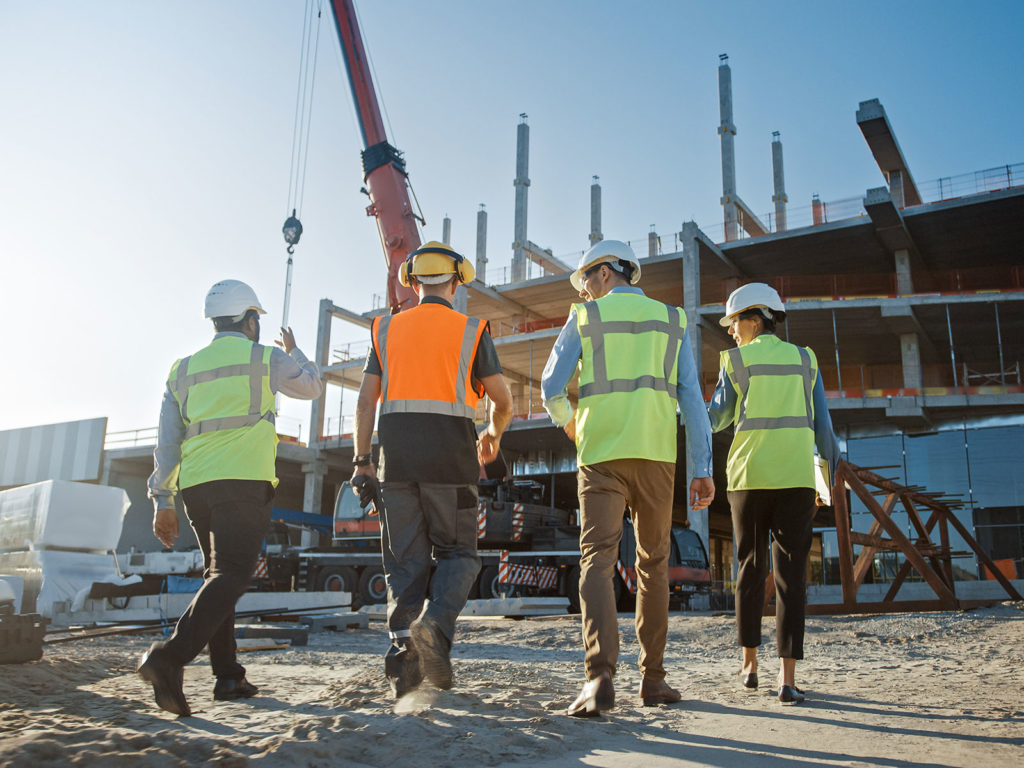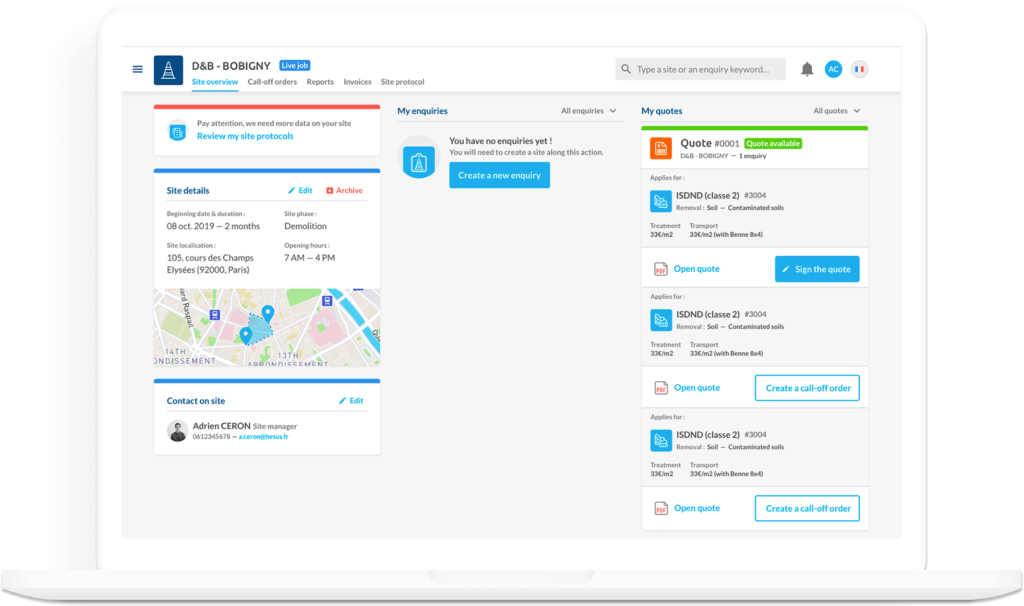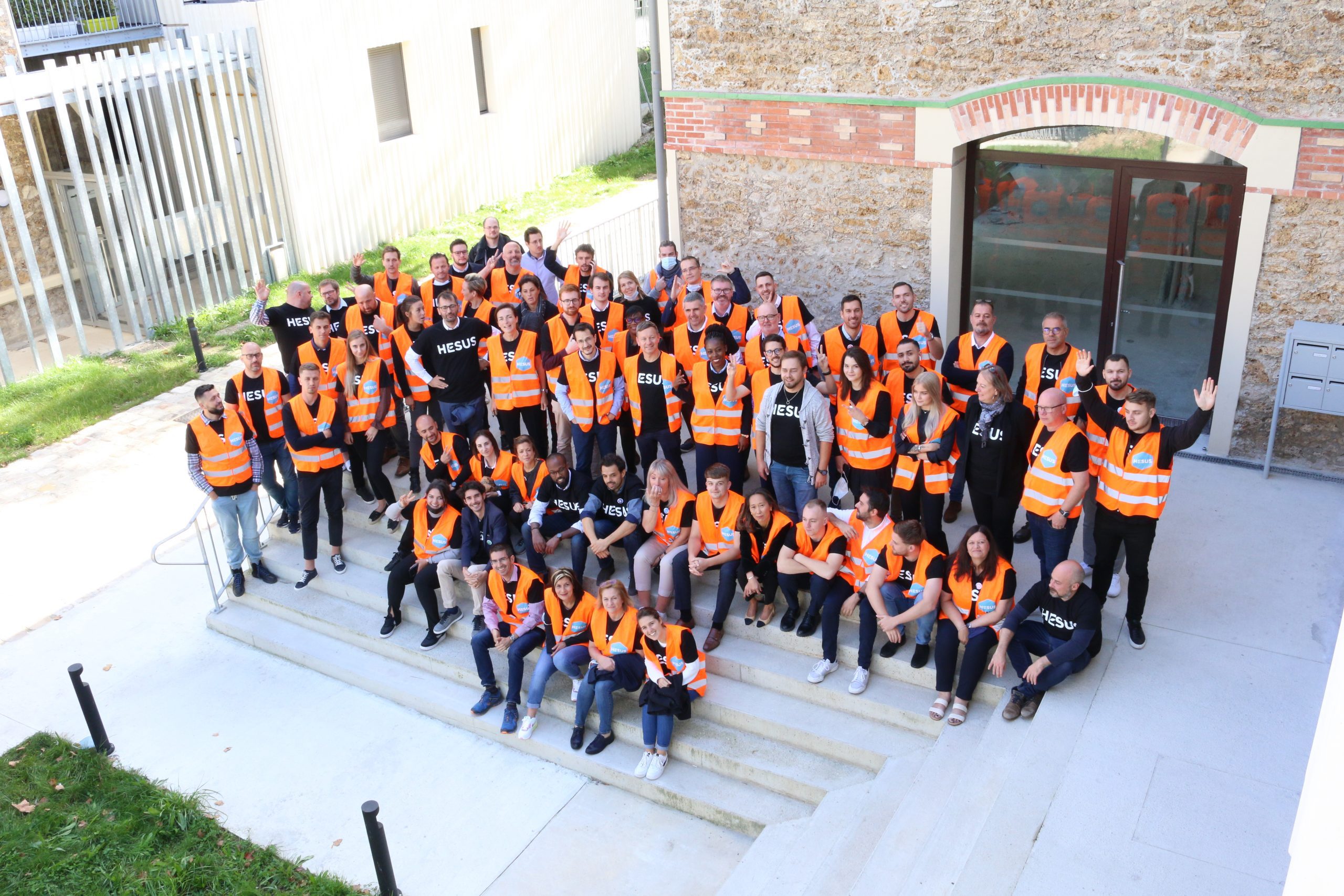





The five main stages in management of construction site waste:
• Analysis and survey of construction site soil
• Waste sorting on site
• Disposal: loading and unloading of spoil and rubble
• Transport to appropriate disposal channels
• Waste treatment and/or recovery
You could try to find service providers for each step, but it can quickly become laborious. To save you this stress and enable you to focus on your core construction or demolition business, it is far simpler to call on a waste management service.
This support offers you several advantages and guarantees high-quality and secure management.
In fact, a construction site waste management service such as HESUS ensures optimised collections, controlled logistics and safe traceability, in compliance with applicable regulations. This service also includes the management of administrative and legal documents, from invoicing to waybills,
A waste management service such as Hesus also supports you and offers advice on the soil study and analysis of the polluted sites and soils survey with regard to the circular economy, recovery and reducing greenhouse gas emissions.
With the acceleration in global warming, managing construction site waste has become a crucial issue for the future of the construction sector. It avoids the storage, incineration, burial, land-filling and illegal dumping of waste. It also reduces the consumption of non-renewable natural resources and therefore helps preserve them, particularly by promoting the use of recycled materials.
Managing industrial waste is now a key issue for governments in Europe, and particularly in France. Reforms are regularly introduced to reduce the environmental impact of construction and demolition sites and infrastructure in particular.
It is in this context that the energy transition for green growth regulation was introduced, establishing reforms to improve traceability and recovery and setting carbon objectives for 2030 and carbon neutrality targets for 2050.
Managing industrial waste, particularly hazardous and polluted waste, reduces the environmental impact of construction sites and so limits health risks affecting living organisms.
Apart from avoiding landfilling – a prohibited practice – managing construction site waste transforms spoil and rubble into valuable resources.
Are you sure you are in compliance with applicable regulations? If in doubt, please contact Hesus, the waste management expert!
You could take care of your site’s waste yourself, just as you could handle management of your company’s waste internally. But this can soon become laborious, expensive and restrictive for a construction site. A service provider specialising in waste management can relieve you of this concern, while also providing you with sustainable solutions to optimise waste treatment.
Whether you are a project manager or a project owner, a waste management service saves you time by relieving you of all the operational aspects required for high-quality management of waste, such as ordinary industrial waste, polluted soil or Japanese knotweed for example. This service will organise and plan the loading, unloading, transport and even the recovery of all your construction site waste for you.
The service also reduces the costs of processing the spoil and rubble present on the construction and demolition sites. In fact, a waste management provider such as Hesus negotiates disposal prices for you with its transporters and waste treatment partners.
A waste management service such as Hesus also offers you the best transport and disposal solutions close to construction sites, in order to reduce truck travel time from the site to the appropriate outlet.
Discover the products managed by our teams!
There are several variables to take into consideration before taking charge of industrial waste, particularly construction sector waste: the volume, the type, the levels of chemical compounds, the hazardousness, etc.
Therefore, they are not processed and/or stored in the same way. To improve the management of construction site waste and ensure disposal in accordance with standards, whenever possible hazardous waste should be isolated directly on site. Whenever permitted by the space on site, steps should also be taken to avoid mixing ordinary industrial waste and inert waste, for example.
It is also economically beneficial to sort waste directly on site, since the cost of treating inert waste is about 10% that of ordinary industrial waste and about 1% that of hazardous waste.
On-site sorting also improves soil management, since sorting inert soils on-site and isolating them from polluted soils avoids returns from waste treatment channels. This also makes it possible to comply with applicable regulations concerning the recovery of waste and to reduce the costs of managing construction site spoil.
To recycle construction site waste, the circular economy remains the most reliable, sustainable and optimal solution.
Embracing the circular economy is a way of limiting consumption and waste of resources and the production of waste. In practice, the circular economy makes it possible to reuse construction site waste, for example, in order to recover it and therefore minimise land-filling.
It is therefore essential to make the right treatment choices when managing waste, in order to use the most suitable treatment method. Indeed, recovery methods will differ depending on the nature of the waste, its volume and its chemical composition.
A waste management service such as Hesus will offer you the best recovery solution based on the hierarchy to be prioritized when managing waste. In fact, the treatment method to be prioritised above all is backfilling, i.e. reuse of the earth from one construction site on the next. For example, reuse the earth from a construction site on a quarry. The second treatment method to be favoured is reuse, i.e. using the earth on the same construction site without it leaving the site. Other treatment methods exist, such as sorting and recycling platforms, treatment centres and even storage facilities, which should only be used as a last resort.
Are you sure you are recovering your earth and waste in an optimal way? If in doubt, please contact Hesus, an expert in recovery and waste management services!
Firstly, it is important to specify that the waste producer is any person whose activity produces waste. In the construction and civil engineering sector, this may be a developer, a manufacturer or a local authority, for example.
The French environment code defined the responsibility of the waste producer, from the moment of production of the waste until its elimination or final recovery – even if the waste is transferred to a third party for treatment. Each waste producer is therefore responsible for how the waste is collected, transported and treated. It must ensure that its service provider is fully capable of taking charge of that type of waste and that its management complies with applicable regulations.
Waste management begins with the waste producer’s fulfilment of its obligations:
• Characterising its waste in order to properly manage it and dispose of it correctly via the appropriate channels
• Sorting the waste according to its type (ordinary industrial waste, non-hazardous waste, hazardous waste, etc.)
• Checking that the waste treatment channels are correctly certified
• Ensuring the traceability of all waste
The holders of the waste also have a responsibility in the waste management chain. Those holders are all the intermediaries in the waste disposal chain, including waste management services such as HESUS.